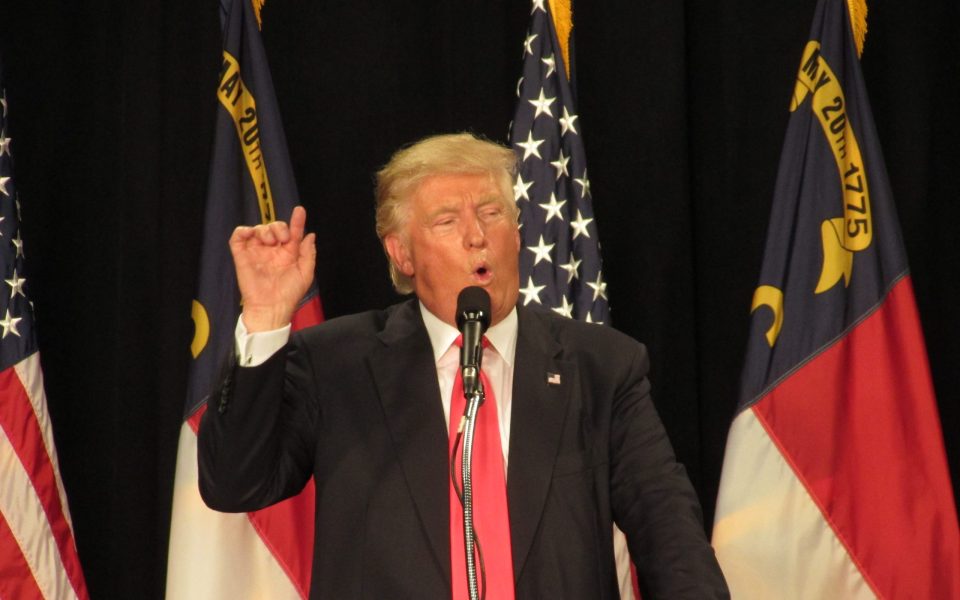Only in the bizarro world of the Trump administration would worrying about whether we’re hurtling down the path to war with Iran seem like an unaffordable luxury. After all, this is a president who has already issued a flurry of draconian immigration orders, started dismantling the Affordable Care Act, made a Supreme Court nomination that could change the course of American jurisprudence, and assembled a cabinet of crackpots and billionaires, while antagonizing the heads of state in Mexico, Australia, China and Germany.
“Iran is playing with fire — they don’t appreciate how ‘kind’ President Obama was to them. Not me!” Trump tweeted on Friday.
While Trump’s behavior often seems unhinged and eccentric, his bellicose stance toward Iran fits a pattern of manufacturing crises to keep his opponents off balance and constantly scrambling to keep up.
The administration’s overreaction to Iran’s ballistic missile test, obsession with unraveling the nuclear agreement brokered by Obama and inflammatory rhetoric runs up a dangerous risk of military escalation.
Joseph Cirincione, a member of the Council on Foreign Relations who served on former Secretary of State John Kerry’s international security advisory board, recently said on Twitter that when friends ask whether the United States could “slip into war with Iran,” he has to answer, “Yes,” while describing Trump’s team as the “most chaotic, inexperienced administration in our lives.”
Two intertwined dynamics make this a particularly dangerous moment: the administration’s propensity to blow Iran’s actions out of proportion, and, the fog of confusion — sometimes actively abetted by the administration, it seems — surrounding the rising tension between the two nations.
First, let’s take National Security Advisor Michael Flynn’s statement on Feb. 1, claiming that Iran’s ballistic missile test is “in defiance of UN Security Council Resolution 2231, which calls upon Iran not to undertake any activity related to ballistic missiles designed to be capable of delivering nuclear weapons including launches using such ballistic missile technology.”
It’s true that the test is concerning: There isn’t much point in developing such a missile for any other purpose other than arming it with a nuclear payload. But it would be more accurate to say that the test defied the spirit of the UN resolution without technically violating it. The resolution’s language is non-binding: “Iran is called upon not to undertake any activity related to ballistic missiles designed to be capable of delivering nuclear weapons.” (Emphasis added)
The next day, White House Press Secretary Sean Spicer took the claim a step further and in doing so misrepresented the national security advisor’s statement when he said, “I think General Flynn was really clear yesterday that Iran has violated the [UN] joint resolution….”
But worse than mis-parsing the language of the UN resolution, the administration conflated a separate international incident completely unrelated to the nuclear non-proliferation agreement brokered by the Obama administration.
While condemning Iran’s missile test, Flynn also raised concerns about Houthi militants supported by Iran who launched an attack against a Saudi Navy vessel off the coast of Yemen.
The next day, Spicer — intentionally or not — mangled Flynn’s words by saying, “I think General Flynn was really clear yesterday that Iran has violated the joint resolution, that Iran’s hostile actions that it took against our Navy vessel are ones that we are very clear are not gonna sit by and take.” If that were true, it would be an act of war.
As the Intercept reported, Major Garrett of CBS News quietly corrected Spicer, saying “a Saudi vessel,” and Spicer responded almost inaudibly, “Sorry, thank you, yes a Saudi vessel,” but did not make any attempt to correct his misstatement that Iran had carried out the attack.
Administration officials clearly want to promote the perception that the Houthi attack on the Saudi vessel was a hostile action directed at the United States. Anonymous sources inside the administration variously described as “the intel community” and “US defense analysts” are cited in a Jan. 31 Fox News report to the effect that US officials believe the attack “may have been meant for an American warship” or “was a dress rehearsal” for an attack on US naval forces. By the end of the week, Fox had still not retracted the flimsy report.
Ironically, the Houthi attack on the Saudi vessel came just a day after US Navy Seals carried out a disastrous raid in Yemen against al-Qaida in the Arabian Peninsula that resulted in the deaths of civilians along with a US service member. While the United States is assisting Saudi Arabia in bombing Houthi forces and fighters associated with former President Ali Abdullah Saleh, an analysis by the International Crisis Group warned that the civilian casualties give al-Qaida the opportunity to make the case to the anti-Houthi population in the area of the attack that America is actually supporting the Houthis.
Similar to White House Counselor Kellyanne Conway’s false claim about a “Bowling Green massacre,” the administration’s confusing assertions and partial clarifications about Iran seem designed to create a false perception to build popular support for an inevitable showdown. The Houthis and al-Qaida in the Arabian Peninsula are pawns in this game, which is really all about Trump’s ridiculous need to show Iran who’s boss.
Join the First Amendment Society, a membership that goes directly to funding TCB‘s newsroom.
We believe that reporting can save the world.
The TCB First Amendment Society recognizes the vital role of a free, unfettered press with a bundling of local experiences designed to build community, and unique engagements with our newsroom that will help you understand, and shape, local journalism’s critical role in uplifting the people in our cities.
All revenue goes directly into the newsroom as reporters’ salaries and freelance commissions.


Leave a Reply